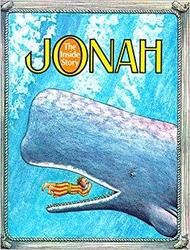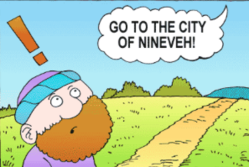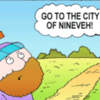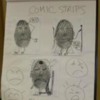Jonah
Lesson Set
Summary of all workshops in this Rotation:
--for 1st- 3rd grade:
- Video: Watch the animated video Jonah: A Veggie Tales Movie. Discuss God’s loving kindness as exhibited in this story.
- Science: Have the students do a science experiment that provides an analogy to illustrate the love of God.
- Storytelling: Hear the story of Jonah, then have the students help re-tell the story to cement the sequence of events in their minds.
--for 4th-6th grade - Art: Focusing on learning the sequence of the story, create comic strips using thumbprint characters.
- Puppets: Use handle-bag puppets to enact skits that tell of second chances. Learn about showing compassion.
- Cooking: Make “Jonah Jelly Turnover Cookies” to give away to a program which feeds lunch to the homeless.
Scripture Reference: The book of Jonah
Key Verse: “I knew that you were a gracious and compassionate God, slow to get angry and filled with unfailing love.” Jonah 4:2d (NLT)
Rotation Objectives - After completing this Rotation, participants will be able to:
- Name that the story is found in the Old Testament.
- For 3rd grade and up: Locate the story of Jonah; identify it as an Old Testament book in the collection known as “Prophets.”
- Re-tell the story in his/her own words.
- Define a prophet as a messenger of God.
- Describe Jonah as a prophet, a reluctant prophet who did not always follow God’s instructions.
- Discover that this story is a profound illustration of God’s love. (God is compassionate, his love is for everyone, he gives second chances, and no one is beyond redemption.)
- Conclude that God calls us to lives of compassion and loving kindness to others.
Story Background
Our story starts out with God telling Jonah to go to the city of Nineveh to warn the inhabitants to repent or be destroyed. Jonah shows his reluctant side and rather than going to Nineveh, he runs in the opposite direction. So starts our story, an illustration of how God’s love and grace is for all people.
The characters in our story
- God: compassionate, loving… you know the rest.
- The prophet Jonah. The Hebrew word, nabi, which translates to prophet means “one who speaks for” or “one who represents” (Wilke). Most prophets felt an urge to speak their pronouncements, “just as a person must be filled with fear when he hears a lion roar nearby (Amos 3:8)” (Orr). This contrasts with Jonah who this time, was reluctant to spread God’s message. The story of Jonah is also different than the stories of most prophets in the Old Testament. Rather than being a book full of prophetic sayings, the book of Jonah tells of just one prophetic mission, one that is described in one verse found in Jonah 3:4 “Forty more days and Nineveh will be overturned.”
- The people of Nineveh (pronounced: NIN-uh-vuh). Nineveh was located on the banks of the Tigris River, where present-day Iraq is located. Nineveh was at one time, the capital of the Assyrian Empire. The Assyrians had not yet conquered the Israelites (that would happen later) yet the people of Nineveh were seen as enemies of the people of Israel.
- The sailors on the ship to Tarshish: Like the Ninevites, they were Gentiles, in other words not Jewish. Their experience with Jonah causes them to worship God.
Why run away from God?
Nineveh was to the east. Instead of heading east, Jonah headed west boarding a boat that was likely bound for Spain. Why did Jonah try to run away from God? “Jonah views the Assyrians as undeserving of God’s mercy. He probably would like to see God destroy them all, for all the hurt they have done to his people. Why should he give them a message that could save them? In Jonah’s mind, they do not deserve God’s mercy.” (McLeod)
From what Jonah says later in the story, we sense that Jonah feared that the people of Nineveh would repent. Jonah knows how God operates. He knew that God was compassionate and loving and always quick to turn from punishment. Jonah was not ready to offer the Ninevites the chance to share in God’s grace. The nation of Israel closely guarded what they viewed as a favored relationship with God. They were forgetting their mission to preach to all people. “Jonah’s attitude is representative of Israel’s reluctance to share God’s love and mercy with others” (iLumina: Jonah: Life Application Notes).
“In Old Testament times, people believed that a god was confined to the territory in which the god’s worshipers lived. So, when Jonah hopped on board a ship heading far away from Israel, he hoped to escape God’s reach. But Jonah soon learned that God is not confined by earthly territory. We cannot hide from God.” (Derden)
Runaway troubles
“When the ship gets out to sea, a violent storm kicks in, terrifying the crew. They begin throwing stuff overboard in an attempt to lighten the load and save the ship. Being superstitious, the try to divine (casting lots) which of them angered the gods enough to cause the deadly storm. Jonah’s name comes up. When confronted, Jonah tells them he is a Hebrew and is running away from the Lord. When asked what they should do, Jonah says to throw him overboard. The crew doesn’t want to do this. How ironic that the non-Hebrews (thinking how Jonah views non-Hebrews) don’t want to kill him and continue to try to row to shore! But eventually, they resort to throwing Jonah in, and the storm suddenly abates.” (McLeod)
The sailors were awestruck by the Lord’s great power, and they offered him a sacrifice and vowed to serve him. (Jonah 1:16)
The Great Fish
A fish swallows Jonah; note that it doesn’t say a whale! This was God’s unique way of saving Jonah from drowning. Jonah spent three days and nights in the fish. He had time to think. Chapter 2 of Jonah contains Jonah’s prayer from inside the fish. This is not a prayer for deliverance but is a prayer of thanksgiving. Jonah realizes that God is giving him a second chance. Sure enough, the fish urps him on to the shore.
Is this story historical?
There is much posturing about whether this story actually happened. What is the likelihood of someone surviving living in a fish for three days? There have been several stories of miraculous deliverances albeit with scarring, from the belly of large fish. Two types of fish capable of swallowing a human being whole are the sperm whale and the whale shark (Constable). Jesus used Jonah’s experience in the fish as an illustration of his death and resurrection (Matthew 12:39-40, Luke 11:29-30). Is this story historical or is it an allegory or a parable? This question is left for your discussion.
Go to Nineveh
“Now the word of the Lord came to Jonah for a second time, ‘Go to Nineveh and announce the message I give you.’ This time Jonah obeyed. He went to Nineveh and preached that God would destroy that great city in forty days. And amazingly, the Ninevites listened and believed! They responded to Jonah’s message by fasting and wearing sackcloth and ashes as a sign of humility and repentance. Even the king took off his royal robes and dressed in sackcloth! He ordered everyone to stop their wickedness, turn to God and pray for mercy. These outward signs reflected an inward change and a hope for God’s mercy. This is what true repentance means. Repentance is not simply mouthing the words, “I’m sorry.” Rather repentance means making a true turnaround in behavior, a turning away from sin and a whole-hearted turn toward God.” (Derden)
Jonah’s reaction
“God heard the repentant cries of the Ninevites and he had compassion on them. He didn’t destroy them. Now we might think that Jonah would rejoice over the success of his mission. Not so! Instead, Jonah was angry! He told God that this is exactly why he didn’t want to go to Nineveh.” (Derden)
I knew that you were a gracious and compassionate God, slow to get angry and filled with unfailing love. Jonah 4:2d
“Here we see the true condition of Jonah’s heart. He obeyed God outwardly, but his heart still wasn’t in it. In his heart he still resented the enemies of his people. He secretly hoped that they wouldn’t listen to his message so that God would destroy them! After all, it isn’t fair! How can God allow a happy ending for these mean and wicked people? In fact, because of his prejudice and hatred of the Assyrians, Jonah would rather die than see this ending.” (Derden)
Jonah pouts – second chances explained
Jonah went outside the city of Nineveh and sat down to wait and watch. Perhaps he was hoping that God would change his mind? Since it was hot, “God causes a plant to grow besides Jonah that provides him with shade and Jonah is pleased. Then God sends a worm that kills the plant, and Jonah is angry, so angry in fact, that he again wished he were dead” (McLeod). Though Jonah hardly comes across as a hero anywhere in the book, he appears especially selfish, petty, temperamental, and even downright foolish in chap. 4” (Stuart, p. 502).
“God questions Jonah about why he is angry about the plant. God explains that if Jonah can care about the plant so much when he had nothing to do with the plant, then he should understand why God cares about people like the Ninevites, people whom he created and loves (even if they are not Hebrews.) Should God not care for the innocents of Nineveh, who don’t even know what they are doing?” (McLeod)
“God loves all people, even those who sin or are ignorant of God. And as God did not turn his back on Jonah (as he was running away,) God does not turn his back on the people of Nineveh. How easy for us as a group (congregation, family, country) to feel self righteous and insular. We start to feel that only we are deserving of God’s message of love and mercy. Those different from us, those who have hurt us, do not deserve God’s love. The story of Jonah illustrates in a humorous way that God will still love us even when we resist God’s call, and that all are worthy enough to hear the message. (McLeod)
References:
- Butler, Trent C. Editor. “Entry for Jonah.” Holman Bible Dictionary. 1991. http://www.studylight.org/dic/...iew.cgi?number=T3474
- Constable, Thomas L. “Notes on Jonah.” 2009. http://www.soniclight.com/cons.../notes/pdf/jonah.pdf
- Derden, Jaymie. “Jonah: The Reluctant Prophet – Background Information.” 2005.
https://www.rotation.org/topic...treet-umc-bristol-va - iLumina Gold Premium. CD-ROM. Wheaton, IL: Tyndale House, 2006
- McLeod, Barbara. “Jonah Bible Background.” 2003. https://www.rotation.org/topic...-background-material
- Orr, James, General Editor. “Entry for Prophecy; Prophets, 1.” International Standard Bible Encyclopedia. 1915. http://www.studylight.org/enc/...iew.cgi?number=T7117
- Wilke, Richard Byrd and Julia Kitchens Wilke. Disciple: Remember Who You Are. Nashville: Abingdon Press, 1996.
- Scripture quotations are taken from the Holy Bible, New Living Translation, Copyright © 1996, 2004. Used by permission of Tyndale House Publishers, Inc. All rights reserved.
A Lesson Set written by folks from:
First United Methodist Church
120 S. State Street
Ann Arbor, MI 48104
Copyright 2009 First United Methodist Church, Ann Arbor, MI.
Permission to copy materials granted for non-commercial use provided credit is given and all cited references remain with this material
If you use this material, even in a modified form, please include the following reference:
Hulbert, Carol. "Jonah: Bible Background." Jan. 2009. Place URL where lesson found inside angle brackets<>.
A representative of Rotation.org reformatted this post to improve readability.








